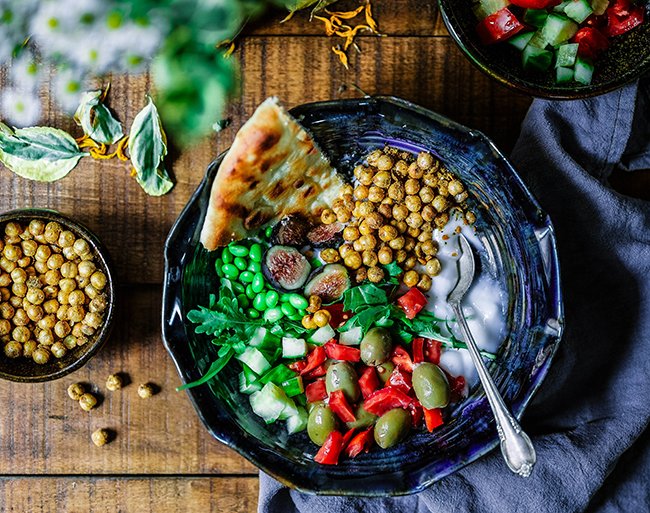Could Vegnuary give a boost to your New Year cycling goals?

Back in 2016, inspired by Rich Roll’s book, Finding Ultra, I set out on a 6-month period of vegan transition – all while training for an Ironman. This is an account of my experience, which hopefully offers endurance athletes a small insight into the world of an ultra-distance, vegan athlete.
First of all, confession time: I still love, and eat, cheese – and this article is not going to be me on my soapbox made from recycled discarded panda bamboo, preaching the delights of being a dyed-in-the-wool vegan.
Taking veganism on, in general, is a right pain. When Pret a Manger change their lunchtime options – hopefully sometime this decade – vegans might just have a fighting chance, but as it stands, we have to generally be the masters of our own plant-based destiny. Nevertheless, being a no-meat (and dairy) athlete has its undeniable benefits, and I’m here to detail all the reasons as to why it’s worth giving it a good old go.
In January 2016 I signed up for my first ever half and full Ironman races – I signed up for both pretty much on the same day, which also conveniently coincided with reading Rich Roll’s engrossing biography Finding Ultra. In this, he details his transition from being the 40-year-old fatso who couldn’t get up the stairs without breaking a sweat, to placing an extremely respectable seventh in the Ultraman double-Ironman event in Hawaii. I consider myself a pretty logical person, and Mr Roll’s arguments seemed to make a lot of sense, so with that in mind, I took the plant-based plunge.
To say the first month was hard would be an understatement. The recently purchased Nutribullet, whose breakfast of reconstituted veggie/fruit mush was busy performing MMA on my gag reflex, didn’t really deliver the goods during a pretty tepid 70km ride-out in early January. Generally, experimentation with this new diet tended to end in disaster to begin with, producing such delights as impossibly bland bean stews and a vegan mac ‘n’ cheese that tasted more like cat vomit. I found myself cursing Rich’s reminisces of pizza dreams as I lay awake, picturing that beautifully crafty, greasy calzone that I’d spent most of my life tucking into.
But, unluckily for the calzone-sellers of my neighbourhood, I persevered. About a month after D-Day I really started noticing a difference in both my body and performance. For one, I dropped weight like it was going out of fashion. I went from my usual 78-80kgs to about 74kg in this time, with my usually insidious belly quite literally crawling into itself. This weight loss added to the extra energy I was experiencing, meant that I could run, ride and swim for longer while expending less effort. I felt light on my feet, I had much less problem getting out of bed in the morning and the calzone cravings had gradually started to ebb away. I actually got to the point where I looked forward to chucking that spirulina and broccoli into my Nutribullet every morning, even if it did taste like a fishpond.
My number one recommendation is to make a general plan and be comfortable in just cutting yourself some slack from time to time. If out of 21 meals a week, you eat good, plant-based foods for 15 of them that’s still going to make a big difference. Get curious about your plant-based cooking; there are some fantastic publications out there such as Thug Kitchen, which offers great grub ideas as well as some pretty hilarious recipe vernacular. The other main piece of advice is to get into the habit of cooking big batches of recipes to last you a while – as much as the catering/hospitality industry has embraced vegan options, they’re still few and far between, not to mention also a little basic. I usually spend Sunday evening cooking up a big batch of a sweet potato stew, homemade baked beans and some roasted broccoli that you can just fling together with half an avocado at lunch. Sorted.
Finally, never ever in your life, ever buy vegan cheese. A shadowy cabal invented that stuff in order to cause riots and bring down society as we know it. If you want cheese, have cheese.
The best analogy I’ve found to explain all this is to imagine your body is a steam train, and what you stoke the fire with is your diet. Sugar is the equivalent of mountains of newspaper, it burns fast and hot; fatty meats and dairy are like chucking in blocks of lard, it’s flammable but inefficient; plant-based foods are like good old fashioned coal, it burns consistently and hot. I completed my first Ironman in 13 hours, fuelled by chia seeds, peanut butter and a quinoa stew, which someone the night before described as resembling dog food. I think I could have gone faster, but I can safely say that taking the steam train analogy, I had all the fuel in the world to bring me over the line; I was just missing an axle and a bolt here and there.
There is a deep cavernous rabbit hole of information out there, as eating healthier goes hand in hand with things like improving your physiology, monitoring sleep patterns, running shoe choices, intermittent fasting, the list goes on. I’m now comfortable in my routine, and I’m making my own hummus every few days, keeping my fridge stocked with fresh and cooked veg and activating nuts on a weekly basis (look it up, it’s madness). But, every once in awhile I open the fridge and halloumi peers into the eye of my soul, and I give in. Because halloumi is awesome, and always will be.
For a quote to make sure your vegan powered bike riding is covered, click here.







